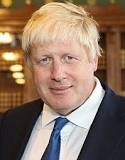Boris Johnson is trying to avoid a one-on-one meeting with Trump. Here's why
Here are the stories our panel of top political reporters have on their radar, in this week's "Inside Politics" forecast.
1. Why Donald Won't Meet Boris
President Donald Trump heads to London this week to celebrate the 70th anniversary of the NATO alliance. He's scheduled to meet with the leaders of Germany and France -- but the White House says he doesn't have a one-on-one visit with his host, British Prime Minister Boris Johnson, on the schedule.
"Johnson is one of the President's best friends in the foreign leader category," Axios White House editor Margaret Talev said. "But Johnson sent very clear 'stay away' instructions, and that's because in about 10 days there are really important elections in Britain."
Johnson's premiership is at stake -- as is the fate of Brexit -- and "President Trump is unpopular in Britain," Talev said.
close dialog
Sign up for CNN's
MEANWHILE IN AMERICA

A daily analysis of US politics for global readers.
Sign Me Up
No Thanks
By subscribing, you agree to our
"But of course, the surest way to make President Trump do something is to tell him he should stay away," she added.
2. Impeachment and 2020
A big question hovering over the presidential race is what impact, if any, getting impeached would have on Trump's reelection prospects. His campaign claims it could actually be a net benefit.
New York Times national political reporter Lisa Lerer said there's some evidence of that in last month's gubernatorial races in Kentucky and Louisiana -- races the Democrats actually won.
"In races where Democrats did well, internal polling from Democratic committees showed that impeachment was a drag," Lerer said. "They feel they won those races by a smaller margin than they would have, had the impeachment hearings not been going on. That's because the proceedings in Congress sort of encouraged Trump supporters to get out there and vote against the Democratic nominee for governor. That's part of the reason why Democrats are eager to move this process quickly and get it done."
3. Riding the Iowa roller coaster
The Democratic primary race has been underway for 11 months, but with just nine weeks until the first votes are cast in Iowa, Washington Post chief correspondent Dan Balz says the race is as unsettled as ever.
"We should anticipate a roller coaster ride from here to the caucuses," Balz said, noting the constantly shifting Iowa polls. "Back in March, it was (Joe) Biden and (Bernie) Sanders who were in the top two. Then in September, it was Biden and (Elizabeth) Warren. In October, it was Warren and Biden. In early November, it was Warren and (Pete) Buttigieg, and now it's Buttigieg and everybody else well behind."
Balz said one lesson of past Iowa races is that the ground keeps shifting until the very last moment.
"Ann Selzer, who does the Iowa Poll and has the best grasp of Iowa, says she'll never say that Iowa has gelled. She's taken polls in the final few days before the caucuses, and on a number of occasions has seen dramatic movement in those final few days," Balz said.
4. The fate of US-Mexico-Canada trade
It's been more than a year since Trump signed a new trade deal with Mexico and Canada to replace NAFTA. He's still waiting for Congress to ratify it -- and Washington Post White House reporter Seung Min Kim said negotiations are coming to a head.
"This could be the week where we see a deal come together," Kim said. "The President has been hammering Democrats on the lack of movement on the US-Mexico-Canada Trade Deal. And as we've seen impeachment go on, we've seen the President get louder and louder about the Democrats' inaction. Right now, Democrats say they're waiting for the administration to fine-tune a couple of things, and they might be able to get that as early as this week."
5. GOP feud in Georgia
And from CNN senior political reporter Nia-Malika Henderson:
Keep an eye on Georgia.
Republican Gov. Brian Kemp is expected to announce his choice to replace retiring Sen. Jonny Isakson in the next few days. The frontrunner is financial executive Kelly Loeffler, who would be just the second woman to represent Georgia in the Senate.
Yet Kemp's possible choice is rankling Republicans, including Trump and his allies who have been pushing the governor to name Rep. Doug Collins, a staunch Trump ally. Will Kemp defy his party by naming Loeffler, a move that could help the GOP with women voters in the Peach State? At least one Republican has said that should Kemp defy Trump, he may face a primary challenge when he is on the ballot in 2022.
No matter the outcome, the next senator from Georgia will face a crowded field in 2020 as Democrats look to make inroads, particularly among white suburban women.
News Courtesy: www.newagebd.net











